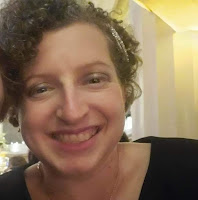We've been running a column series (for over three years now!) to get more personal with our readers. This month, we're talking about mental health in honor of May being Mental Health Awareness Month. Mental health has been featuring more in novels lately and we definitely appreciate it.
We're always open to topic suggestions, so please don't hesitate to share those in the comments. We'd also love to know if you can relate to anything we've said or hear your own thoughts on the topic. So don't be shy. :) We look forward to getting to know you as much as we're letting you get to know us. You can find our previous columns here, in case you missed them.
I was raised in a way that did not support one’s mental health. I don’t place blame for that. It was based on the generational belief that you had to “tough it out” or “suck it up.” I wasn’t aware of anyone in my family ever seeking help through therapy. Or, relying on meditation, exercise, medication, or any of the other methods that someone can lean on in times of stress and chaos. Most of my own baggage would often get swept under the proverbial rug, never to be seen from again, yet always there, lurking beneath the mental fibers of my being. I never felt comfortable to “talk it out” or share my feelings. I never saw value in it.
I think when an individual has that type of mindset, control sets in. If I can have control over my surroundings, over my own choices, over my life, over everything, in general, it means less room for stress and chaos. It means never having to deal with fallout. But, as with most things in our world, there is so much one cannot control. Sometimes, s%&$ happens, and when I’m faced with a situation that feels like it’s out of my realm of control, I completely spin out.
A good example of this had been during a time of health complications for me, which happened to coincide with the pandemic. Early 2020 brought on mystery ailments and despite numerous testing, my doctor(s) had no clue what was wrong with me. I had immense pain that traveled down and through my right arm, into my hand/fingers. I had a burning sensation in my upper right back which looped around, under, and into my right armpit, extending into the right side of my chest. Broken capillaries spread out along my upper right abdomen, and to this day, no one knows what caused it or why it’s there. I’m sure that won’t be discovered until I’m gone. I lost strength in my right leg and right foot, my cadence changing when I’d walk or run. My father noticed it one day while we were out for a hike–the way my foot appeared to turn in a bit, almost pigeon-toed. There were visual cues that went beyond the physical ones that no one could see, but even then, I was a medical mystery.
I felt betrayed by my body. I’ve been physically active for years. I’ve run marathons. I never questioned my strength and mobility, not until 2020. I was convinced I had cancer. Doctors suspected a gallbladder issue. I imagined the conversation I’d have with my children when I’d have to break the news to them that I had an incurable disease. I couldn’t sleep, because I constantly researched online, trying to find the answer to what was really going on with me. I tried hard to keep up the mother and wife facade I’d had before the medical mystery, but it felt like a constant struggle. I didn’t want to talk about it because I knew I’d break down, and I couldn’t do that. Breaking down was not an option. Being vulnerable is never an option for me.
I made the decision to seek counseling in March of 2020. I remembered the Talkspace advertisements I’d seen on tv, and given the pandemic’s restrictions, it felt like the best, safest option for me. It was nerve-wracking at first–the first online Zoom meet-up with my therapist. It might sound silly, but I was nervous. I didn’t know what to expect, or what she’d want to talk about. With Talkspace, you can choose to pay extra for continual Zoom meet-ups, or you can opt for the messaging route, which I really liked, because she’d chat with me nearly every day during the week. She’d send something, then I’d send my response, and the next day, I’d find a reply waiting for me. It started with suggestions on finding ways to calm down, with breathing techniques and meditation. When we found ourselves in the meat of my health fears, she worked with me to focus on letting go of the control I sought in order to stay protected in my life. For that, we had to dig deep into my past. What I focused most on is the fact that I can’t always control what happens or has happened in my life. What I can control is how I handle and deal with it.
It was an intense, five month relationship. Later that summer, after I’d prompted my medical doctor to order up an MRI of my neck/back area based on a gut hunch, we discovered I had a disc compression indenting my spinal cord that originated from the cervical spine. I also have degenerative retrolisthesis of my C5-C6. It lends into the pain I experience on the right side of my body, with compromised nerves creating burning sensations within my skin. After receiving the diagnosis and discovering ways to minimize and live with my disc compression, as with physical therapy and other exercises, along with what my therapist suggested I do to manage the emotional and mental ramifications, I felt like I was at a point where I could continue forward without my therapist. She’d given me the tools. I felt ready to use them on my own.
That doesn’t mean I won’t ever go back to therapy again. I know it’s always there for me. I notice such a difference in the way I live my life now. I don’t feel that helpless lack of control when I’m faced with an uncomfortable or scary situation. I don’t jump to conclusions or feel like I’m spiraling. Plenty has happened in my life since my diagnosis–my father’s cancer diagnosis. The loss of a friend. Job stressors. But I have the tools I learned in therapy to guide me through it. And knowing I can always go back helps, too.
It’s Mental Health Awareness Month, and while I feel the label of it is a great concept to raise awareness for the importance of mental health, I think it should extend beyond a month during the calendar year. Mental health affects so many areas of life–the physical, the emotional. The relationships you have with others. The relationship you have with yourself.
Melissa Amster:
When we first chose mental health as a topic, I knew exactly what I wanted to talk about: Self Care. I feel that self care is important no matter where you are in life. People usually emphasize that it is meant for parents, but I feel that everyone should be finding ways to look after their own needs. I was practicing self care long before I had kids and I feel that it is important that my kids are practicing it for themselves, as well. In my life, I practice self care by reading (obviously), finding things to laugh about, talking/texting with friends, watching my favorite shows, listening to music, exercising every morning, taking baths, eating foods I enjoy (occasionally indulging a bit too), etc. Everyone's version of self care looks different though.
While I know that self care is meant for everyone, I want to personally endorse Balanced Working Moms. It was started by a woman in my community who is one of the kindest and most positive people I know. She started it pretty simple, but has expanded it to coaching sessions, classes, podcasts, etc. I invited an author friend to join the Facebook group a while ago and I know she highly endorses it too. I do know that women who don't have kids have joined the group, just to find general balance in their lives. While it is geared toward working moms, there is a lot of valuable advice and information that could apply to anyone.
I recently attended a coaching session to work through my lack of motivation and it helped get me on the right track. I still do have times where I feel unmotivated, but we focused on a few key areas and that really worked well. We came up with strategies together for finding motivation to do mundane tasks and that has made things a lot easier for me. For example, shopping feels like a huge chore for me, even when it's someplace fun. We came up with a few ideas to make the shopping trip more entertaining and/or rewarding. One way is to make it into a scavenger hunt and take a photo of something amusing or an inside joke and then send it to someone who would enjoy that photo. She also helped me figure out how to break down household chores to make them feel less overwhelming but like I accomplished something too. Having said all this, you could feel unmotivated with or without kids and there are ways to work with how you are feeling no matter what.
I would love to hear what you do for self care. I'd also love to know what you do to work through something simple that currently feels challenging for you. Please feel free to share in the comments section! I'll be cheering you on for sure!
Tell us your thoughts on mental health. What is something you are focused on for this topic?
Enjoyed this post? Never miss out on future posts by following us.


No comments:
Post a Comment